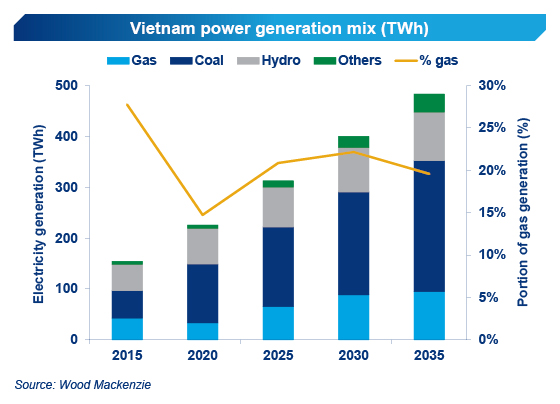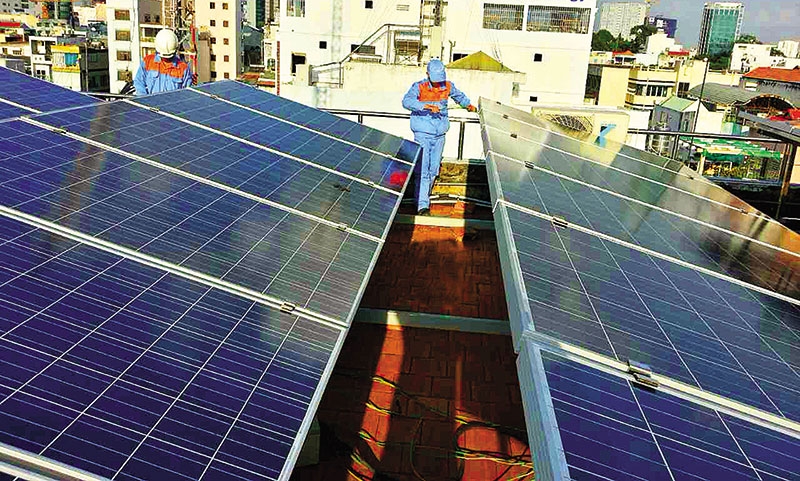
Google will power 100 percent of its sprawling data centers and offices with renewable energy starting next year.
The tech giant on Tuesday said it had bought enough wind and solar power to account for all the electricity it uses globally each year. That means the servers handling your Google Maps requests, storing your backlog of unread Gmails and holding the work of aspiring YouTube stars will use only emissions-free energy.
Last year, just 44 percent of Google's power supplies came from renewables, the company said.
"It's been a long road here, but we're excited that we finally reached it," Neha Palmer, Google's head of energy strategy for its global infrastructure division, told Mashable.
Google's announcement arrives at an uncertain time in the clean energy sector.
President-elect Donald Trump — the only climate-change denying global leader — has vowed to scrap rules for curbing greenhouse gas emissions and instead accelerate fossil fuel production. He's expressed no small amount of disdain for wind farms.
If the future Trump administration lags on environmental progress, companies will likely play an even greater role in growing the U.S. clean energy market, said Nathan Serota, a senior analyst at Bloomberg New Energy Finance in New York.
"A Trump presidency could actually wind up causing corporations to pick up the slack, and to fill the leadership vacuum on renewable energy that's being left in the federal government," he said.
Businesses will also need to become more vocal advocates of policies that make it easier or cheaper to build wind, solar and other cleaner projects, said Gary Cook, an IT sector analyst for the environmental group Greenpeace.
"Corporate leadership has been critical in driving a lot of the renewable energy investment," Cook said. "It could be even more important in the coming years and months with much less leadership, and more hostility, from the federal government."
Google, for its part, said it has no plans to change its clean-energy approach under Trump.
"We will continue to run our business in an environmentally responsible way," Palmer said. "We'll hold to our values, which includes obviously continuing to procure renewable energy."
Tech's clean energy grab
Tech companies in particular are buying more renewable power for two key reasons.
First, it benefits their bottom lines. The price of solar energy in the U.S. has plunged 80 percent since 2012, while the price of wind power has tumbled 60 percent, thanks to improving technology and design, lower financing costs and less regulatory red tape. Solar and wind power is increasingly competitive with conventional sources like natural gas or coal.
When companies buy power from a wind or solar project, they often sign long-term agreements with the projects' developers. The contracts set a fixed price for the electricity over 10 or 20 years, which allows companies to manage their future expenses and ideally save money in the end.
Google signed the country's first corporate renewabales deal in 2010, with a contract to buy 114 megawatts of electricity from a wind farm in Iowa.
Since then, Google has signed agreements for 17 more wind farms and two solar projects in six U.S. states and six countries.
Together, the 20 projects can produce 2,600 megawatts of clean electricity — enough to power all of Google's direct operations worldwide. The power doesn't account for indirect electricity demand from its third-party manufacturing partners.
The second reason for the clean energy push? Corporate sustainability goals.
As the digital economy expands, digital companies are building more energy-quizzling data centers around the world. Businesses are now facing increasing pressure from their customers and environmental groups to meet that rising energy demand with renewables, rather than higher-emissions coal and natural gas.
Tech companies alone now account for about two-thirds of all corporate renewables deals signed since 2010, or about 4,700 out of 7,000 megawatts under contract, according to a tracker compiled by the Rocky Mountain Institute, an environmental think tank.
"The IT sector has been leading the charge among corporations to purchase renewable energy to power their rapid growth," said Cook from Greenpeace.
Cook is the lead author of the group's annual "Click Clean" report, which ranks major internet companies on their environmental performance. In the 2015 report, Google was listed as a "green internet innovator" while Amazon Web Services was considered "middle of the road" and Oracle was considered stuck in the "dirty energy past."
"Given the growth of the sector, there's still a lot to do," Cook said. "Some companies are still lagging, in terms of really matching up their growth with an equivalent amount of renewable energy supply."
.png)
Social media giant Facebook scored well in the last Greenpeace report after making "radical improvements in transparency" and encouraging Iowa utilities to invest billions of dollars in new wind farms by building a Facebook data center in the state.
Two other Facebook data centers — in Clonee, Ireland and Los Lunas, New Mexico — will be powered entirely by clean energy when completed, a spokesperson noted in an email.
Apple, one of Google's top competitors, has also made sizable progress on clean energy.
The California tech company in September said it would be partner with its far-flung manufacturers to reduce carbon emissions from factories — a major component of Apple's carbon footprint. Apple already powers nearly all its data centers, offices and retail stores worldwide with renewables.
In August, Apple won U.S won U.S federal approval to start selling clean electricity, just as Google did in 2010.
Microsoft this fall announced a new goal to get 50 percent of its data centers' power from clean energy sources by 2018, and 60 percent renewables by the early 2020s.
At Salesforce, the goal is 100 percent renewables for the firm's global operations. To that end, the cloud computing company signed two major agreements last year with wind farms in Texas and West Virginia.
"Looking forward, corporations have the opportunity and the responsibility to play a major role in transforming our energy systems so they are reliable, safe and clean," Suzanne DiBianca, Salesforce's chief philanthropy officer, said in an email.
Google's own efforts to buy wind and solar power could make it easier for more companies, tech or otherwise, to follow suit, Palmer said.
For instance, Google recently worked with Duke Energy in North Carolina to build a 61-megawatt solar project that will power Google's new data center in the state. As part of the deal, other companies in the area now can also buy renewable energy through Duke, with no added cost for ratepayers.
"We're hoping that the increased demand will actually push the market to become more innovative, and we'll see new technologies, we'll see new ways to integrate renewable energy as a result," Palmer said.
Editor's note: This article has been updated to clarify that companies in North Carolina can purchase renewable energy through Duke Energy but not directly from Google's solar project in the state.
Source: http://mashable.com





.png)


